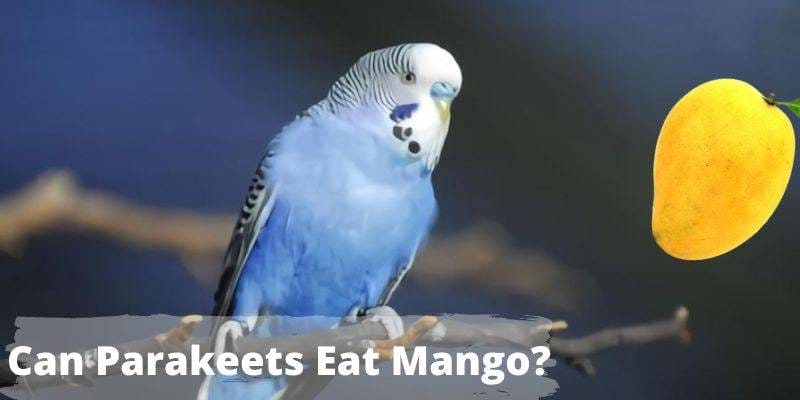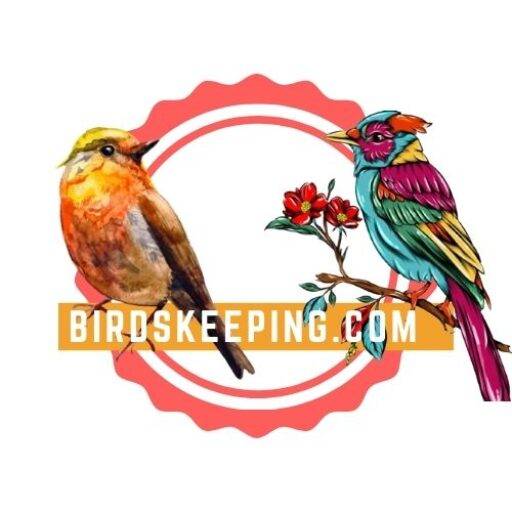Mango is one of the favorite fruits of people. Many people who love to share their foods with birds have this question and often ask online portals about this question, can parakeets eat mango?
Parakeets can eat a mango without any hesitation, and they love to enjoy eating mangoes. There are many nutrients present in the mango that help in the growth of birds. Read below to know how you can feed parakeets mango.
Table of Contents:
- Is Mango Safe For Parakeets?
- Do Parakeets Like Mango?
- Benefits of Feeding Parakeets Mango
- How To Feed Mango To Parakeets?
- How Much & How Often To Feed Parakeets Mango?
- Can Parakeets Eat Mango Skin?
- Can Parakeets Eat Dried Mango?
- Can Parrots Eat Mango Seed?
- Summary
Is Mango Safe For Parakeets?
Yes, mangoes are completely safe for parakeets. Mangoes are full of nutrients, including an ample amount of vitamin C, A, minerals, and antioxidants.

Mangoes are relatively low in calories, which means this will not disturb their regular eating patterns. You can easily feed mangoes to parakeets with their regular diet. What can parakeets not eat?
As far as mangoes are safe and healthy for parakeets, a certain factor is involved when you opt for mango. If you love birds and have a basic knowledge of parakeets’ health, you might know parakeets can have diabetes.
Yes, you read that right! Some parakeets are born with diabetes, and some might develop it over time.
The mango has an ample amount of natural sugars. So, overfeeding mangoes to parakeets may cause them to develop diabetes.
Perhaps, mango is very beneficial for parakeets’ health as long as it is in moderation. According to experts, fruits should only be 10% of parakeets’ daily diet.
Adding mangoes to parakeets’ feed will add a tasteful addition to their nutrient-rich diet. But never forget moderation is the key. Can parakeets eat cantaloupe?
Do Parakeets Like Mango?
Mangoes are one of the favorite fruits of parakeets. A parakeet may never give up the chance of gobbling upon sweet mangoes.
But, it is natural that some birds have different taste preferences than others. The same goes for parakeets, and they can also be picky about different things.
As said before, the majority of parakeets love to eat mangoes. The best way to determine whether your parakeet like mangoes or not is to serve a small quantity with regular feed.
If the parakeet doesn’t eat the mango at first, let them discover the taste of mango on its own. You can check after a while if they eat it after some time.
Parakeets are selective eaters, so it is quite common if they don’t eat something at first and love it later on.
So, if your parakeets love mangoes, give them a good treat and let them enjoy it. Mangoes are full of natural sugar, which gives parakeets an energy boost.
If they aren’t eating it, don’t try to feed them. Try giving mango often with a regular diet, and they will surely love to discover the sweet treat.
Benefits of Feeding Parakeets Mango
Vitamin C, Vitamin A, potassium, niacin, and beta-carotene are some of the nutrients found in mangoes.
Vitamin C
Mango is one of the fruits with the highest vitamin C, far behind citrus fruits. Every 100 grams contains about 36 grams of vitamin C.
Vitamin C is essential in a bird’s diet because it helps maintain a strong immune system, protects it from oxidative stress, and improves cardiovascular health.
Vitamin A
Mangoes also contain Vitamin A. Beta-carotene from vitamin A is responsible for the mango’s bright, eye-catching color.
It helps in maintaining epithelial tissues and mucous layers and is an important benefit of vitamin A in the parakeet’s body.
This vitamin also keeps the bright, green, orange, blue, or red colors in your parakeets. Vitamin A also helps to protect the becks and nails of parakeets and give rise to their health.
Without sufficient mucus layers, pathogens can attack and cause diseases or infections in the digestive, and reproductive systems.
Antioxidants
Mangoes have polyphenols that protect parakeets from illness and premature aging. Antioxidants are also responsible for the maintenance of the immune system and its smooth functioning.
Niacin
It is a necessary nutrient for parakeets. It plays a vital role in reducing joint pain, keeping arteries of the heart fat-free, and increasing the strength of muscles.
Potassium
Mangoes also have an essential nutrient for parakeets known as potassium. This is responsible for the proper growth and development of parakeets.
It also helps to enhance the proper functioning of the kidney. It also helps to enhance the metabolism of parakeets.
How To Feed Mango To Parakeets?
Serving mango to parakeets is a very straightforward process, just cut open the mango and remove the pit. Follow the steps given below.
- Peel the skin because it might have harmful pesticide residue.
- Cut mango into small slices or cubes.
- If the mangoes are cold or stored in a refrigerator, warm them up for a few seconds in the microwave. Because parakeets are more attracted to fresh and warm fruits, always try to serve fresh mango because that will be irresistible and taste delicious.
- Now serve the mango in a try to parakeets.
- If possible, place the mango tray near the parakeet’s water dish because some parakeets like to dip fruits in water. This will add convenience to it.
It’s that simple to serve mangoes to parakeets. Always clean the uneaten fruit residue from their cage. Observe their eating patterns, notice if they like mango or not, or eat a few slices and ignore others.
Observe what they ignore, so next time you can ensure to serve what they like to eat. As we have mentioned earlier, parakeets are picky eaters.
Don’t serve the mango too often, as parakeets can be bored of it easily. Add mango to their regular diet now and then so they can enjoy it, and in this way can maintain moderation, which results in healthy mango eating and happy parakeets. Can parakeets eat sunflower seeds?
How Much & How Often To Feed Parakeets Mango?
In general, parakeets should have 10% of fruits in their daily diet. This means you can feed mango to parakeets two times a week.
This is an ideal estimate to maintain moderation and healthy fruit for your parakeet. As we have discussed, mangoes are rich in natural sugar.
Excess amounts of mango can harm the parakeet. Hence you can feed mango as a treat to parakeets.
When you give mangoes to parakeets gradually, they will love it and demand a larger portion. But it would be best if you will be strict here to avoid any harmful activity. Can baby budgies eat seeds?
Once you give them a large portion to satisfy their craving, they will keep demanding it. So, it would be best if you will keep this thing in mind.
To avoid such a situation, always start by serving a tiny portion of mango to a parakeet. Gradually increase it so that you can control the healthy feed, and it will also satisfy the parakeet’s craving.
Can Baby Parakeets Eat Bananas?
So, now you know how much and often feed mangoes to parakeets. By following the above guidelines, you can ensure the parakeet has all the health benefits of mango without compromising any health factors.
Can Parakeets Eat Mango Skin?
Yes, parakeets can eat mango skin. Generally, most people think mango skins are inedible, and they throw them away. But In fact, mango skin also has a good amount of nutritional value. Nutritionists have discovered that mango skin has a good amount of dietary fiber and vitamin E.
Mango skins can be a very good feed option for your birds, including parakeets if they are obese.
The mango skin inhibits adipogenesis (weight gain) because mango skins have a high amount of calories and fiber compared to mango pulp, which keeps the parakeet fulfilled for a longer time and fulfills the nutrition requirement.
Although, along with all the benefits mentioned earlier, feeding parakeet mango skin is not recommended.
Because mango skin can have harmful residues of pesticides or preservatives, Which can cause harm to parakeets if you are planning to feed mango skins to your parakeet, make sure mangoes are completely organic with no harmful residues.
Can Parakeets Eat Dried Mango?
Yes, parakeets can eat dried mangoes when fresh mangoes aren’t available. But it is not recommended as dried mangoes available at stores may have harmful preservatives and additives such as sulfides. Those mangoes can even cause an allergic reaction to parakeets.
However, you can freeze mango to preserve its nutrition and give it to a parakeet. Parakeets may enjoy ripping off the peels and their chewy texture, which gives them really good mental stimulation.
Overall, it is highly recommended to get fresh mango for your parakeets as those are juicy, tasty, and tempting.
Can Parrots Eat Mango Seed?
No parrot can not eat mango seeds. It is not suitable for birds and parakeets to eat mango seeds. As we already know, Mangoes have a single large seed crowded with juicy flesh.
The seed is much larger as compared to the tiny mouths of birds and parakeets. That’s why birds can’t eat them.
However, sometimes when mangoes were introduced to parakeets, their owner gave them seed with pulp.
Otherwise, it is not safe to eat mango seeds for parakeets. Some fruits having seeds contain amygdalin which is a chemical compound fatal for birds and animals.
Summary
Mangoes are one of the healthier fruits for humans. But feeding mango to birds, especially parakeets, is still confusing for many people out there. Parakeets can eat mango and gets benefitted from the nutrients present in it.
While choosing the mango for parakeets, always go with fresh mangoes, and do not forget to remove the pits. You can also feed them dried mangoes, but it is not recommended to give them dried mango if you can find a fresh one.
Birdskeeping is supported by its readers. When you purchase through links on our site, we may earn an affiliate commission. Also, as an Amazon affiliate, we earn from qualifying purchases without costing you extra.
